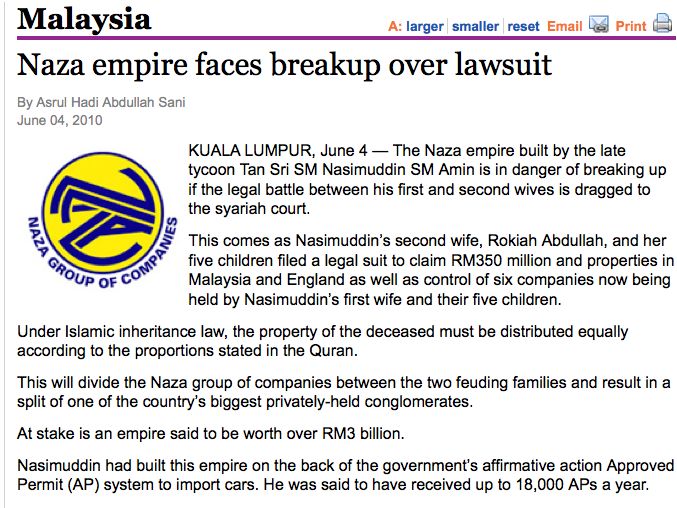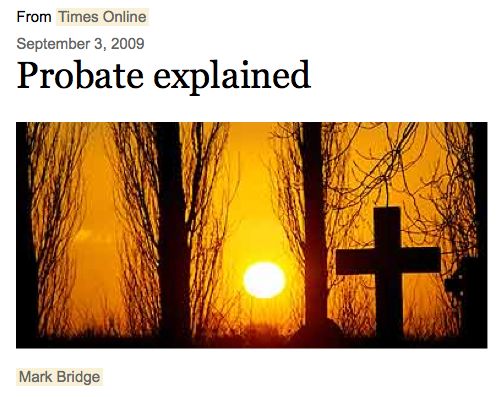Estate planning for non-Muslims and Muslims can be worlds apart. For Muslims, the Syariah inheritance laws take precedence over any civil considerations. When a Muslim dies, his estate will be subjected to divine laws already laid down in the Quran and there are no two ways that this can be avoided.
The news item below from the Malaysia Insider describes clearly what happens to a Muslim’s estate. There is a big potential scrape brewing over the outcome of a suit lodged by the family of the second wife of a deceased Muslim businessman to claim their share of the estate. It’s going to be messy because this man’s business and personal empire is estimated at about RM3 billion. That’s nine zeros behind the number 3. Here’s the story:
KUALA LUMPUR, June 4 — The Naza empire built by the late tycoon Tan Sri SM Nasimuddin SM Amin is in danger of breaking up if the legal battle between his first and second wives is dragged to the syariah court.
 This comes as Nasimuddin’s second wife, Rokiah Abdullah, and her five children filed a legal suit to claim RM350 million and properties in Malaysia and England as well as control of six companies now being held by Nasimuddin’s first wife and their five children.
This comes as Nasimuddin’s second wife, Rokiah Abdullah, and her five children filed a legal suit to claim RM350 million and properties in Malaysia and England as well as control of six companies now being held by Nasimuddin’s first wife and their five children.
Under Islamic inheritance law, the property of the deceased must be distributed equally according to the proportions stated in the Quran.
This will divide the Naza group of companies between the two feuding families and result in a split of one of the country’s biggest privately-held conglomerates.
At stake is an empire said to be worth over RM3 billion.
Nasimuddin had built this empire on the back of the government’s affirmative action Approved Permit (AP) system to import cars. He was said to have received up to 18,000 APs a year.
The Naza group of companies includes a complex array of over 30 entities engaged in businesses ranging from automobile trading to hotels to property development and taxi services while the family holdings apparently included properties in London and Los Angeles.
Syarie lawyer Aziz Hassan told The Malaysian Insider that the Quran is very clear on the distribution of inheritance.
“Islamic inheritance law can be found in the Quran and it predetermines and states how the inheritance is distributed among the family. It is quite clear and there is no issue of anything circumventing unless the inheritors agree otherwise.
“It states how much the parents, spouse and children get. Also, how much can a son and a daughter inherit. All of it is stated.
“The most fundamental aspect in the inheritance law is that the son is the one who takes the most after the residue,” he said.
“In normal circumstances, the parents will get 1/6, the wife or wives will together get 1/8, the sons will get two portions and the daughters get one portion. That is the basic distribution of inheritance under Islam after the debts are paid.”
The companies being claimed by the second wife and her children are Naza Kia Sdn Bhd, Naza Automotif Manufacturing Sdn Bhd, Nasim Sdn Bhd, Naza Motor Trading Sdn Bhd, Naza TTDI Sdn Bhd and NZ Wheels Sdn Bhd.
 The suit in the High Court was filed by Rokiah, 53, and her children Sharifah Roslina, 26, Mohd Azli, 25, Sharifah Rosnani, 24, Sheikh Mohamad Azrul, 21, and Sharifah Sofia, through the law firm of Jamil Mohamed Shafie & Associates.
The suit in the High Court was filed by Rokiah, 53, and her children Sharifah Roslina, 26, Mohd Azli, 25, Sharifah Rosnani, 24, Sheikh Mohamad Azrul, 21, and Sharifah Sofia, through the law firm of Jamil Mohamed Shafie & Associates.
Named as defendants were Nasimuddin’s estate, his first wife Puan Sri Zaleha Ismail, 57, and her children, Datuk Faisal, 31, Nur Diana, 28, Sheikh Mohd Nasarudin, 26, Sheikh Mohd Faliq, 25, and Nur Nadia, 24.
Besides the sum of RM350 million, the plaintiffs are demanding Zaleha, her children and CIMB Trustee declare all assets, movable and immovable property in the country and overseas, that was owned by Nasimuddin from May 1, 2008 until now.
The plaintiffs are also claiming interest in the companies, assets and properties of Nasimuddin in Malaysia and in England.
They also want Ekspedisi Nikmat to hand over details of assets held in trust for Nasimuddin.
Aziz said Islamic inheritance law has precedence over any written will.
“Whatever net value, it goes to this ratio. It is very clear and there is no question even if there is a will. Unless we want to respect the deceased and his will then everybody has to agree in complying with the will. Otherwise the inheritance law will prevail,” he said.
According to the statement of claim, the plaintiffs are claiming that while Nasimuddin was alive, he had promised to hand over Naza Kia, Naza Automotif Manufacturing, Nasim, Naza Motor Trading, Naza TTDI and NZ Wheels to them.
The plaintiffs are also claiming that before he died, Nasimuddin had told them his assets were worth more than RM3 billion and handed over to them details of the companies and properties he owned.
The properties include a few bungalow properties in Malaysia, five properties in London, a bungalow in Johannesburg, South Africa, as well as an apartment and a bungalow in Los Angeles, the US.
The plaintiffs claimed that Nasimuddin also told them that CIMB Trustee was the trustee of a significant portion of the movable and immovable assets, including shares in the companies.
However, Aziz stressed that the wives can lay claim to jointly-acquired property (harta pencarian).
“It does not matter as it can be proven that the wife’s marriage is legitimate then 1/8 is shared among the wives but as far as the wives are concerned, they can lay claim to jointly-acquired property or wealth accumulated since marriage,” he said.
“The first wife should theoretically get more because of the period of marriage and the younger will get less.”
He added that the claim to jointly-acquired property must be made before inheritance is distributed.
“The jointly-acquired property must be given before the inheritance law is applied but the property must be claimed and the contribution must be proven. So it is not automatic. What do you claim? How much do you claim? And how do you prove that you have contributed to the acquisition of the assets. The right is there but you have to prove your claim,” he said.
Aziz admitted that determining the value of the Naza empire would be a major stumbling block in determining an accurate distribution.
“Yes, she (Rokiah) has not been married for a long time so definitely she has claim to jointly-acquired property. However, the question is how much is her share? The problem is that nobody knows the true value of Naza’s property. Private companies are very difficult to value.
“Technically, all the companies under the Naza group were held under the name of the deceased so all of it must be considered as inheritance. Unless it can be proven otherwise,” he said.
The plaintiffs said they had asked Nasimuddin’s first wife and children to settle the issue of their rights.
They also said that on Jan 27, the defendants, through Akhberdin & Co, had sent a letter to them offering RM20 million as a final settlement for their claims without taking into account the intentions of Nasimuddin.
Through lawyers Radzuan Ibrahim & Co, the plaintiffs had requested for the case to be settled with a payment of RM350 million and for the control and assets of Naza Kia, Naza Automotif Manufacturing, Nasim, Naza Motor Trading, Naza TTDI and NZ Wheels to be handed over to them as promised by Nasimuddin to Mohd Azli, the second son of his second wife.
They also demanded a temporary payment of RM20 million from Zaleha and her children through Ekspedisi Nikmat and for the balance of their claims to be made after trial.
Second son Nasarudin declined to comment when contacted yesterday.
Nasimuddin started his business in 1974 and was awarded almost 18,000 APs for imported cars a year from the government.
Naza also came under the spotlight late last year when it was awarded 65 acres of valuable government land in the highly-prized Duta area of Kuala Lumpur with an estimated gross development value of RM15 billion without going through an open tender.
Naza is best known for its motor trading business which includes distribution rights to Mercedes Benz, Ferrari, Porsche and Harley Davidson. The group also assembles Kia and Peugeot cars in factories in the north of Malaysia.
We now want to split up the properties and divide the proceeds, but my brother is worried that he may be forced to move out of what he calls “his” house. Do we need to sell everything or can I let my brother simply keep the house? Also, what do we do about the orchard? Although I love my brother dearly, I do not simply want to give it to him for nothing.


 This comes as Nasimuddin’s second wife, Rokiah Abdullah, and her five children filed a legal suit to claim RM350 million and properties in Malaysia and England as well as control of six companies now being held by Nasimuddin’s first wife and their five children.
This comes as Nasimuddin’s second wife, Rokiah Abdullah, and her five children filed a legal suit to claim RM350 million and properties in Malaysia and England as well as control of six companies now being held by Nasimuddin’s first wife and their five children. The suit in the High Court was filed by Rokiah, 53, and her children Sharifah Roslina, 26, Mohd Azli, 25, Sharifah Rosnani, 24, Sheikh Mohamad Azrul, 21, and Sharifah Sofia, through the law firm of Jamil Mohamed Shafie & Associates.
The suit in the High Court was filed by Rokiah, 53, and her children Sharifah Roslina, 26, Mohd Azli, 25, Sharifah Rosnani, 24, Sheikh Mohamad Azrul, 21, and Sharifah Sofia, through the law firm of Jamil Mohamed Shafie & Associates. His non-working widowed wife thought that obtaining a distribution order from the Land Office was the end of the matter but no, she was told that as her three children were still below 18 years old, two-thirds of her late husband’s EPF money would be transferred to the Amanah Raya Bhd (ARB) as the public trustee for them.
His non-working widowed wife thought that obtaining a distribution order from the Land Office was the end of the matter but no, she was told that as her three children were still below 18 years old, two-thirds of her late husband’s EPF money would be transferred to the Amanah Raya Bhd (ARB) as the public trustee for them. Here is Times Money’s guide to probate and administration.
Here is Times Money’s guide to probate and administration.